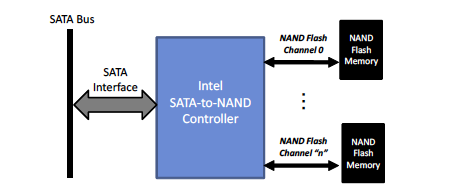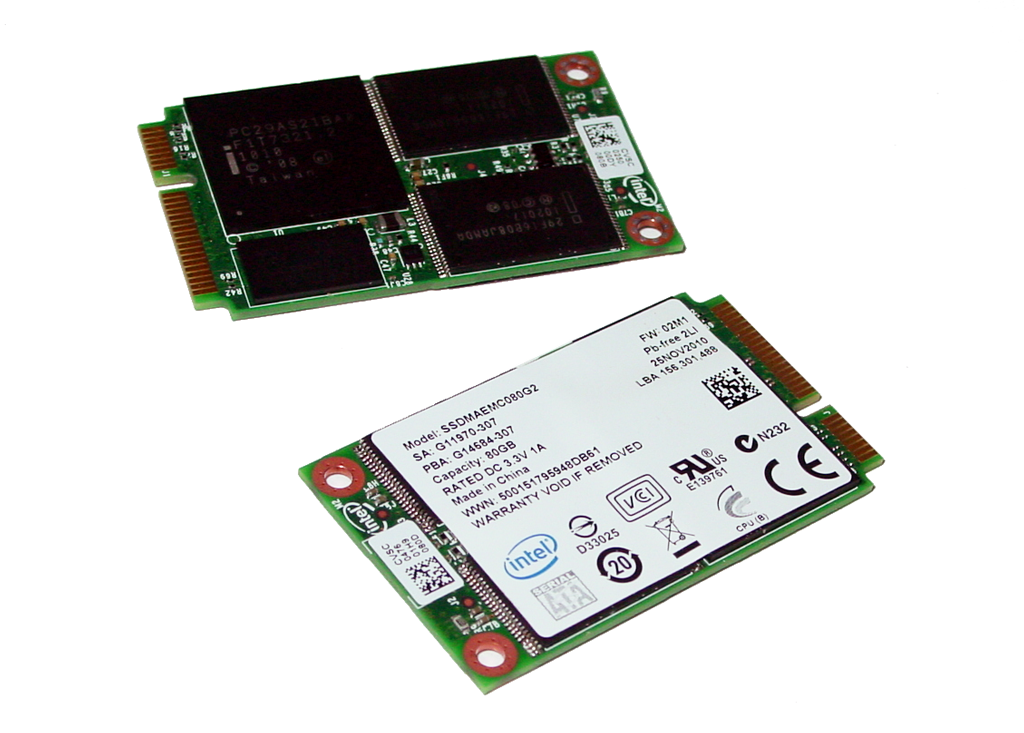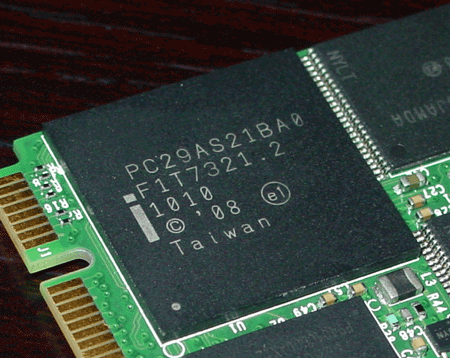Meet Intel's SSD 310: Like X25-V, Only Smaller
The 310-series marks the entry-point of mSATA for the masses. This new standard brings the native SATA protocol straight to a slot form factor. We are talking about pure SATA performance without any bottleneck.
In case you were wondering, the two sets of contacts on the cards pictured below do not correspond to the power and data connectors you'd normally attach to a SATA hard drive (15 pins and seven pins, respectively). Even still, the 52-pin interface hosts a pair of differential signal pairs, just like the desktop SATA interface.
If that number rings a bell, it's because that's how many pins you'd find on a mini PCI Express slot instead. We'll go into more depth on the slot specifics shortly.
Intel's latest SSDs are rather small, but they are supposed to deliver performance on par with full-sized SATA-based SSDs. Indeed, there's certainly the potential for high-end throughput, as the mSATA-based SSD 310-series uses Intel's PC29AS21BA0 NAND controller--the same one seen on the company's X25-M drives.
Remember, though, the controller represents only one variable in the SSD performance equation. Intel's X25-M and X18-M drives employ a 10-channel parallel architecture that facilitates sustained sequential reads of up to 250 MB/s and writes of up to 100 MB/s (for the 120 and 160 GB versions of the drives).
Though Intel doesn't cite the figure specifically, its SSD 310-series features five NAND flash ICs, suggesting a more conservative five-channel architecture employed on the 80 GB version we have here for testing, rated for up to 200 MB/s reads and up to 70 MB/s writes. Intel also claims 4K read IOPS of up to 35 000 and 4K write IOPS as high as 6600--identical to the 80 GB X25-M that earned so much praise more than two years ago when it launched.
The 40 GB drive's stats are notably handicapped in comparison, ducking in at up to 25 000 read IOPS and 6600 write IOPS. But with maximum reads at 170 MB/s and writes clocking in at up to 35 MB/s. Write performance, at least, might suffer compared to the faster 7200 RPM mechanical disks out there.
Get Tom's Hardware's best news and in-depth reviews, straight to your inbox.
Incidentally, Intel's 40 GB X25-V also employs a five-channel architecture. Not surprisingly, its performance specifications are identical to the 40 GB SSD 310
| Header Cell - Column 0 | 40 GB | 80 GB |
|---|---|---|
| Components | 34 nm NAND Flash Memory (MLC) | 34 nm NAND Flash Memory (MLC) |
| Read/Write IOPS(maximum, Queue Depth 32) | 25 000 / 2500 | 35 000 / 6600 |
| Bandwidth PerformanceRead/Write (Sustained) | 170 MB/s35 MB/s | 200 MB/s70 MB/s |
| LatencyRead/Write | 65 μs / 100 μs | 65 μs / 75 μs |
| Power On to Ready | 1.5 s | |
| Form Factor | mSATA (50.80 mm x 29.85 mm) | |
| Operating Voltage (3.3V mSATA rail)Min / Max | 3.14 V / 3.47 V | |
| Power Consumption (Typical)Active/Idle | 150 mW / 75 mW | |
| Temperature | Operating: 0 C to 70 CNon-Operating: 55 C to 95 C | |
| Shock | 1500 G/0.5 msec | |
| Vibration | Operating: 2.17 GRMS (5-700 Hz)Non-Operating: 3.13 GRMS (5-800 Hz) |
SSDs continue to be one of the most expensive upgrades, and the 310s is no exception to that rule. We were originally told to expect prices just under $100 for 40 GB and $180 for 80 GB, which falls in line with pricing for the X25-M. The price for the 80 GB version is a little high at the moment, because we only see it in stock at a single retailer. This should change once more inventory hits the market. Intel says that it's expecting motherboards to start popping up with mSATA slots onboard, which will give desktop enthusiasts an opportunity to try this technology out. Knowing full well that Intel intends to expose SSD-based caching on the desktop with its Z68 chipset in the Computex time frame, we wouldn't at all be surprised to see mSATA become even more prevalent on desktop motherboards in Q3'11 explicitly for that purpose.
Make no mistake, these diminutive drives are purpose-built for systems where there is no physical way to squeeze in a second drive: netbooks, thin-and-light notebooks, mini/sub-notebooks, all-in-one computers, nettops, and embedded platforms.
| Header Cell - Column 0 | Street Price | Price/GB |
|---|---|---|
| Intel 310 40 GB | $100 | $2.50/GB |
| Intel 310 80 GB | $200 | $2.50/GB |
| Intel X25-M 80 GB | $170 | $2.13/GB |
| Intel X25-M 120 GB | $225 | $1.88/GB |
Current page: Meet Intel's SSD 310: Like X25-V, Only Smaller
Prev Page Notebooks: One Drive Only? Next Page mSATA: Completely New-
Annisman Great article!Reply
Been rocking an SSD for about a year now, and there is no going back to mechanical drives, SSD for the laptop segment makes even more sense. I think most of us however would like to see price drops a bit faster though, my 120GB OCZ Vertex Turbo cost me over 500 dollars. -
acku Reply9509117 said:Great article!
Been rocking an SSD for about a year now, and there is no going back to mechanical drives, SSD for the laptop segment makes even more sense. I think most of us however would like to see price drops a bit faster though, my 120GB OCZ Vertex Turbo cost me over 500 dollars.
I believe the last report I read mentioned close to 60% of all SSD purchases are mobile related. SSDs can really mark up a notebook's price, so I'm right there with you on prices. We need price drops, more of them, and in quicker succession.
Cheers,
Andrew Ku
TomsHardware.com -
alyoshka It's high time they came up with the ROM or CMOS chip that has the capacity to just store the OS on it and a few other programs, that itself will make the system really very fast..... then they could go over for a change to the 6GBps SATA drives and make them work at that speed..... Really, we already have ample RAM and expandable slots for them, why not get a little more creative and just get the job done instead of going all the way round and trying this approach.Reply
We have fast, extremely fast drives but at prices that touch the sky, wouldn't it be better to just have loaded or embedded the OS straight onto the mobo.... cheaper until it's capable of handling the high data flow rates offered by SSD... yet not being able to saturate the SATA flow rates or capacities..... -
amk09 Newegg Daily Shell Shocker has a 128GB Kingston SSD on sale for $119.99!!!!!!!!!!!!!!!!!!!!!!!!!!!!!!!!!!!!!Reply
History has been made. SSD's are finally starting to hit a dollar/GB. Keep those prices dropping! -
druids84 Although I of course would enjoy having 120+GB SSD on my laptop or home desktop, only true photo/video professionals or gamers with ample games need that much fast storage! I am able to squeeze Win7 and several Valve games within my old 30GB OCZ Vertex SSD, and I would feel quite comfortably with having 64GB SSD just to have more breathing space. You do NOT need more than that unless you're processing a lot of photos/videos. 120+GB is only if you include movies and music. You don't need 20,000 IOPs or 250MB/s seq.reads for your movies and other sitting junk! ;) Just buy a cheap external 2.5" HDD and store all your movies/music/photos on that, and this solution is quite mobile if you drag your laptop everywhere!Reply -
Travis Beane druids84Although I of course would enjoy having 120+GB SSD on my laptop or home desktop, only true photo/video professionals or gamers with ample games need that much fast storage! I am able to squeeze Win7 and several Valve games within my old 30GB OCZ Vertex SSD, and I would feel quite comfortably with having 64GB SSD just to have more breathing space. You do NOT need more than that unless you're processing a lot of photos/videos. 120+GB is only if you include movies and music. You don't need 20,000 IOPs or 250MB/s seq.reads for your movies and other sitting junk! Just buy a cheap external 2.5" HDD and store all your movies/music/photos on that, and this solution is quite mobile if you drag your laptop everywhere!My Steam folder alone is 437GB. I have another 100GB+ on non steam games also. Then add my OS and etc.Reply
I currently enjoy the faster speeds of 4x500 RAID 0 with the OS on a 1TB. I would actually be running 8x500GB RAID 0 if my case was large enough, and my graphics card weren't so large (blocks 2 slots).
How does Toms feel about doing a showdown between $500 of modern HDD vs $500 of modern SSD? With and without a dedicated controller.
I know for my next build I don't know whether I want 4x 3TB or a 3TB with 2-3x SSD or 3x 3TB with a single small SSD, or is it better to go with, say, 8x 1TB or 4x 3TB in either RAID 0, 10, 5, 6, 50, 60 etc. :) -
druids84 Well, just as I mentioned earlier, my point still holds: you DON'T need more than 120+GB unless you're serious gamer or professional working in multimedia business. And your setup sounds a bit like "gamer with ample games" case from my argument. ;) I really can't see a way I could squeeze 4x RAID in ordinary non-gaming laptop, which is what many if not most of people use for actually doing their work.Reply
So, if I would have to choose between old-school 500GB HDD, overkill 256GB SSD, or just simple 60-128GB SSD + external 2.5" HDD for a laptop, I'd go with the last one. -
romulous75 meh, when I added an SSD drive I did not notice much improvement. I have a raid 5 array of WD2003FYYS drives which use to be the boot drive ;)Reply -
romulous75 oh, and also I seem to be the first one loaded in COD black ops when it changes levels :)Reply


